Overview
As a student, you are likely to be tasked with essay writing time and again. Through academic essays, you are expected to express effective understanding and knowledge of the subject matter or the topic. Besides, an essay may be of different forms each of which has a writing format or style of its own. The common types of essays you come across as a student include argumentative essays, expository essays, persuasive essays, and so on.
Table of Contents
The fact of the matter is that the structuring of your essays is as imperative as the content of your essay. Having said that, what we need to acknowledge is that the thesis statement is a vital part of your essay’s structure. However, it is commonly seen that most students miss out on adding a thesis statement to their essays or have some sort of confusion while framing the thesis statement of their essays. Can you relate to the same confusion?
Well, this guide will address all your doubts and misconceptions regarding thesis statements. This guide explains in detail what a thesis statement is and where exactly you need to add it to the introduction of your essay. Besides, the guide also highlights the various types of thesis statements along with examples. So, let us get started without further ado.
What is a thesis statement?
As mentioned above, the thesis statement is included in the introduction paragraph of your essay or position paper. The thesis statement is introduced in the introduction after you have explained the background brief of your topic and the purpose of the essay. The thesis statement puts forth the pivotal or the central idea of your essay or your position with respect to the essay’s topic.
The length of the thesis statement is subject to vary as per the topic of the essay or the type of essay you are writing. In some cases, a thesis statement can be a single sentence or in some essays, a thesis statement can be two to three sentences long. In either case, it should clearly underline the purpose of the essay.
Simply put, from your thesis statement itself, it should be clear to the reader what the essay is about and what your stance is. The perfect thesis statement will be the one that leaves no room for any misinterpretation.
Discussing further, it is notable that thesis statements are subject to change depending on the type of essay that you are writing. Besides, if you are writing a position paper, the thesis statement may be a lot different from how you write the thesis statement of an essay.
Primarily, there are two types of thesis statements namely explanatory and argumentative. Speaking of an explanatory thesis statement, it introduces the subject to the reader but never declares any stance that needs to be defended through an argument. Explanatory thesis statements are more relevant in the case of expository essays or research essays.
On the flip side, in the case of an argumentative essay, the thesis statement is in the form of a firm claim that is to be supported by effective arguments in the essay. An argumentative thesis statement is not a factual statement or a personal opinion or response to a topic. Now that you know what a thesis statement is, the subsequent section discusses how you can write a thesis statement and the same is explained via practical examples.
How to write a thesis statement
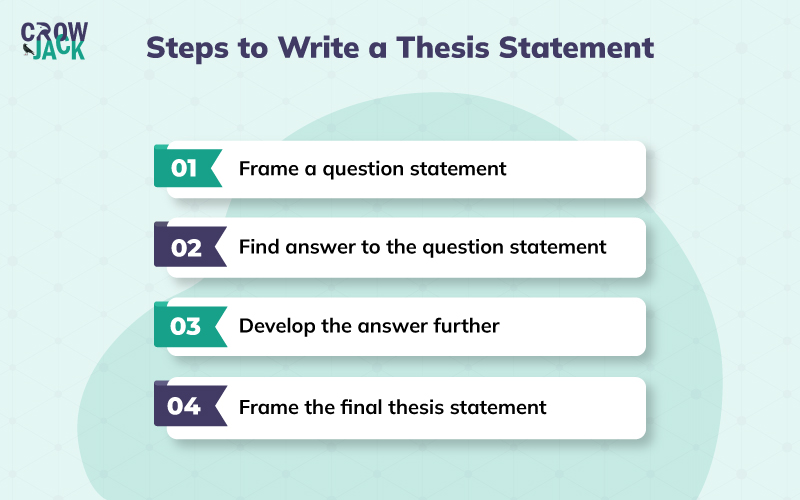
There are some quick steps that you need to follow when you write the thesis statement of your essay or position paper. These steps are listed below.
1. Determine the question statement
When you frame the thesis statement of your essay, you first need to determine the question, “what is your essay going to talk about and what will be your argumentative position?” This comes into the picture when you have understood your essay’s topic well and then you want to make a structured title for your essay.
What we need to essentially do is frame a question statement that will lead to the thesis statement. This question will not be the final thesis statement but will facilitate the development of the thesis statement. In most cases, what you need to answer in your essay will be mentioned in your assignment’s guidelines. However, in case it is not mentioned in the guidelines, then you should think of it on your own.
Let’s say you are tasked with writing an essay on obesity to discuss the psychological impact of obesity. So, for your initial thesis statement, you may ask the following question before you build on the thesis statement:
How does obesity interfere with the cognitive development of young children in the US?
2. Answer the question statement
After you have formulated the question with respect to your essay topic, formulate the answer for it. This tentative answer that you formulate should give a direction to the essay and should be inclined to clearly state the purpose of your essay.
So, if we carry forward the same example from above, the possible answer can be:
Obesity is known to be one of the major reasons for cognitive decline in young children.
Here, you are not merely framing an answer but also taking a position that is debatable and can be argued by others. So, if you look at this answer, it clearly states obesity is the primary cause of cognitive decline in young children which is completely refutable. Others may argue that obesity has no relation to cognitive decline or that there are other reasons which supersede obesity as a factor contributing to cognitive decline.
3. Develop the answer further
In the next step, you further develop the answer that you have formulated above. To explain, you need to develop the answer in a way such that you can correlate it with the reader and compel the reader to agree with your answer.
It is notable that the manner in which you develop your answer is subject to change with the type of essay you are writing. To elucidate, if you are writing an argumentative essay, the statement will be developed differently from the thesis statement of an expository essay. Along similar lines, if you are writing a personal narrative essay, the thesis statement will look a lot different.
So, if you are writing an argumentative essay on obesity as in the case of the above example, the thesis statement will be:
Empirical evidence suggests that obesity outweighs other causes of cognitive decline and disabilities in young children.
4. Crosscheck the thesis statement
Once you have drafted your thesis statement, you then need to refine it keeping in mind the purpose of a thesis statement. If needed, you need to optimize your thesis statement to ensure that it clearly explains why you have taken a particular position, what the essay offers to the readers and what will be the key talking points in your essay.
At the end of all these quick steps that will also require some basic research, you will be able to write a well-framed and meaningful thesis statement that will create a great impression on your professors.
So, ultimately, the thesis statement that we have been developing since step one would seem like this:
Empirical evidence suggests that obesity outweighs other causes of cognitive decline and disabilities in young children. While the physical implications of obesity are given more attention, the psychological effects of obesity in young children also need to be analyzed for greater awareness and more efficient childcare.
So, now you know all that you ever wanted to know about writing a thesis statement and how you should go about writing a thesis statement. Moving ahead, let us shed light on some key characteristics that your thesis statement must include. It is important to note there is no fixed template for a thesis statement. The thesis statement is subject to change depending on the context of the essay. This is just one reason why it's a good idea to have your work viewed by an editor who specializes in academic papers. This can help you be confident you have delivered your thesis in the most appropriate way. However, the generalized characteristics of an effective thesis statement are listed below.
Characteristics of thesis statement
An ideal thesis statement should fulfill the following criteria
1. It should be concise
The fact of the matter is that the introduction of your essay needs to be concise and quite straightforward. The thesis statement being a part of the introduction hence, should not be too lengthy or wordy. The thesis statement is supposed to be a concise gist of your essay’s central idea and your position.
2. It should be disputable
As mentioned above, in the thesis statement, you take a position that can be confronted or disputed by others. Especially in the case of an argumentative essay, you need to make sure that the thesis statement represents a debatable position.
3. It should be coherent
The thesis statement of your essay should be coherent with the background brief of the topic and the purpose of the essay. Your thesis statement will be placed between the background brief of the topic and the explanation of your structure. Having said that, it should be coherent with both these elements of your essay introduction. For greater clarity, you can read our guide on how to write an essay introduction.
Lastly, we move to the types of thesis statements that you need to keep in mind. These types are contingent on the different kinds of essays that students have to write as a part of their assessments.
Types of thesis statements
1. Thesis statement for an argumentative essay
Simply put, in an argumentative essay, you are supposed to take a specific position with respect to the topic or an issue. Further, it requires you to collect substantive evidence and present an analysis of facts to support your position.
Having said that, the thesis statement of an argumentative essay should clearly depict the position that you are taking and explaining with logical reasoning and supporting evidence. Let’s look at an example of the same.
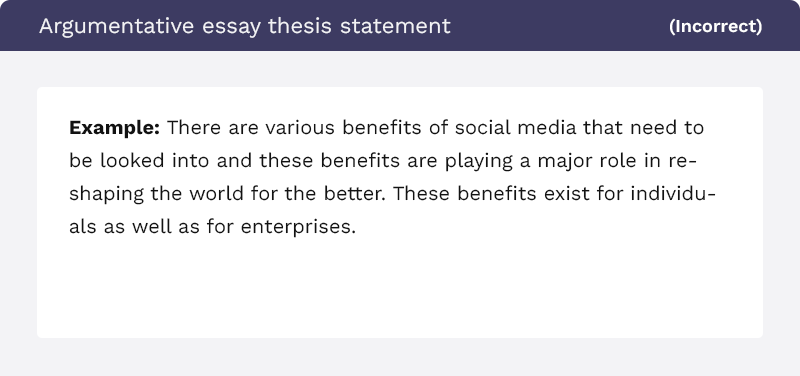
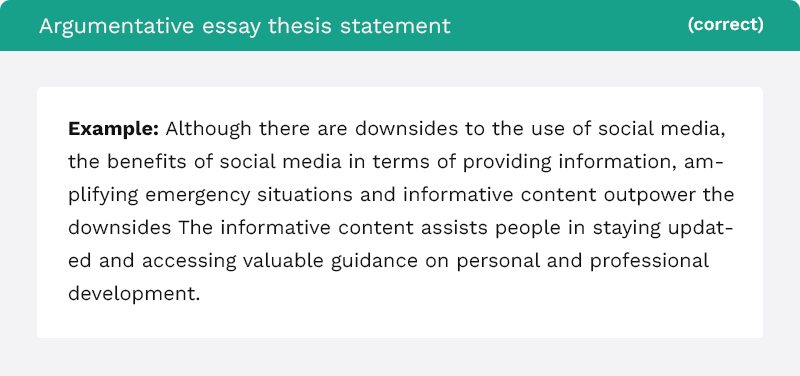
2. Thesis statement for an expository essay
An expository essay puts forth factual and insightful information on a topic for the purpose of investigating an idea and scrutinizing the available evidence to propose a logical explanation of the topic. The major emphasis is on the facts that correlate to the topic or the process linked to the topic.
In the thesis statement of an expository essay, you need to establish the central idea of your essay along with the key talking points. An example of the same is given below.
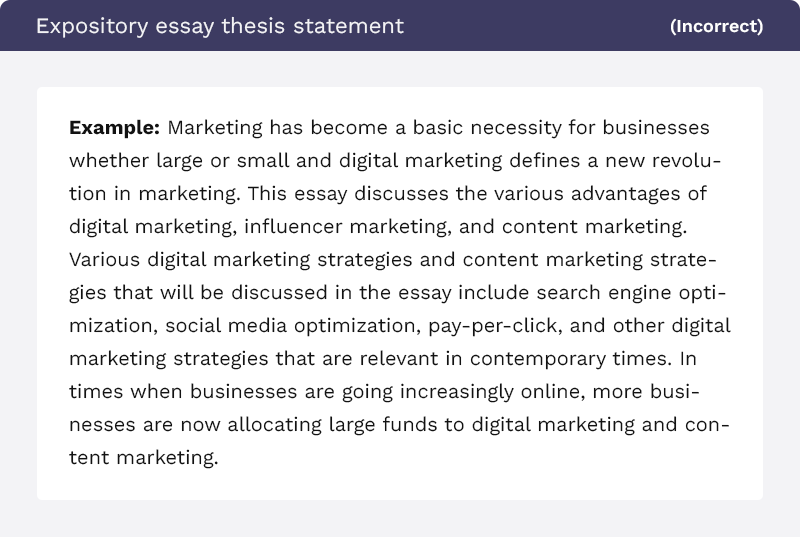
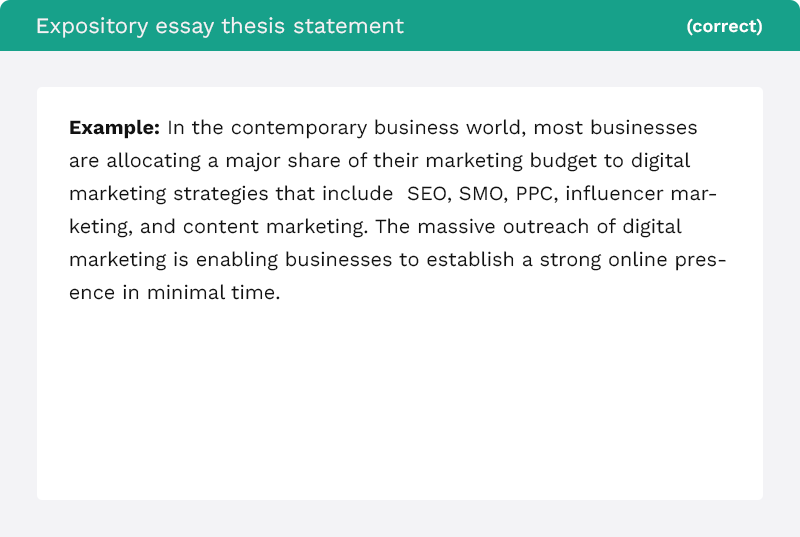
3. Thesis statement of an analytical essay
In an analytical essay, you are supposed to analyze the given topic with the assistance of the factual information and claims available on the topic. Further, an analytical essay looks into the cause and effect relationship of things for an in-depth analysis.
Let us look at an example for a more lucid understanding
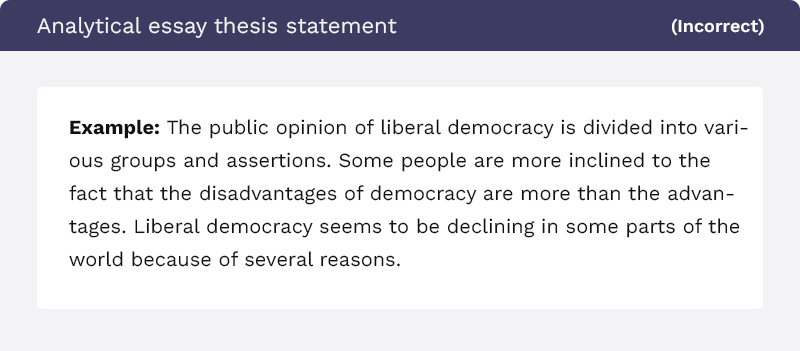

Recommended Readings
How to write an assignment for HD grades
Types of plagiarism and how to avoid
To encapsulate, in case you didn't have any idea of what a thesis statement is and how it is written, on the other side of this useful guide, you will surely feel a lot more confident. We have explained in detail the stepwise process of writing a thesis statement and how thesis statements vary subject to the different types of essays.
FAQs
Can a thesis statement be revised during the writing process?
Yes, thesis statements can be revised as the writer refines their argument or uncovers new evidence during the writing process.
How can one determine if their thesis statement is effective?
An effective thesis statement should pass the "so what?" test, meaning it should answer the question of why the reader should care about the argument. It should also be clear, specific, and compelling, encouraging readers to continue with the paper.
Is it necessary to provide a thesis statement in every academic paper?
In most academic papers, especially essays and research papers, a thesis statement is vital as it sets the framework for the entire work.
What are some strategies to narrow down a broad topic into a specific and effective thesis statement?
To narrow down a broad topic, consider focusing on a particular aspect or angle that interests you the most. Conduct preliminary research to identify key points and arguments, then refine your thesis to encompass the main idea.
Can I use "I" or "In this essay" in my thesis statement?
It is generally best to avoid using first-person pronouns or phrases like "In this essay" in the thesis statement. Instead, focus on presenting a clear and direct argument without unnecessary phrases.

 Proof Reading
Proof Reading  Copy Writing
Copy Writing  Resume Writing
Resume Writing  Blogs
Blogs Guides
Guides SOP's
SOP's Student Resources
Student Resources Research Topics
Research Topics Login
Login Register
Register